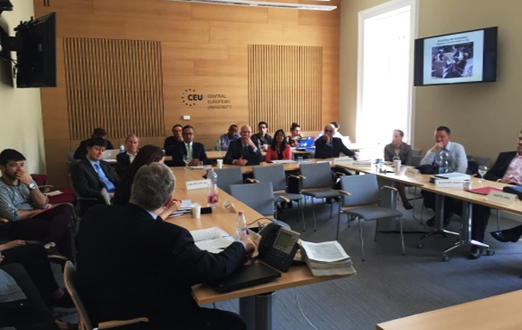Religious Freedom and Security: Central European University, Budapest, 20-21 May 2016

The Department of Legal Studies at Central European University and the International Center of Law and Religion Studies (ICLRS) at Brigham Young University co-sponsored a conference in Budapest, Hungary on 20-21 May 2016. The conference titled Religious Freedom and Security explored topics such as addressing the religious factor in conflict settings, rights and security, and approaches to religion and security issues.
The conference opened with a welcome and introduction by Renáta Uitz, Chair of the Comparative Constitutional Law Program at CEU, followed by a keynote address by Husain Haqqani, Former Ambassador of Pakistan to the United States, and currently Director for South and Central Asia, Hudson Institute, Washington DC. Professors W. Cole Durham, Jr., Founding Director, and Brett G. Scharffs, Director, represented ICLRS in the conference.
Other participants in the conference were Brian J. Grim, President, Religious Freedom and Business Foundation; Christopher Marsh, Professor of National Security and Strategic Studies at the U.S. Army School of Advanced Military Studies; Kishan Manocha, Senior Adviser on Freedom of Religion or Belief, OSCE Office of Democratic Institutions and Human Rights (ODIHR); Jennifer S. Bryson, Director of Operations and Development, Center for Islam and Religious Freedom, United States; Lucian Leustean, Reader in Politics and International Relations, Aston University, United Kingdom; Amos Guiora, Professor of Law, University of Utah College of Law; Dilnoza Satarova, Associate Officer on Freedom of Religion or Belief, OSCE / ODIHR; Jeffrey Haynes, Director of Faculty Research and Professor of Politics, Centre for the Study of Religion, Conflict and Cooperation, London Metropolitan University; John Smith, Vice President of Cybersecurity & Privacy Law, Raytheon Company, former lead lawyer for homeland security at The White House; and James Patton, Executive Vice President and Chief Operating Officer, International Center for Religion and Diplomacy, Washington DC.
The conference explored the delicate balance between religious freedom and security. Speakers tested the utility and limits of a human rights based approach, and explored secular and faith-based perspectives on pressing contemporary problems.
Conference abstract: According to familiar accounts, religious liberty emerged both as an antidote to religious violence and as a tool for promoting social stability and peace. Historical origins in the wars of religion, however, do not explain contemporary threats to global and national security which are justified in the name of religious teachings and convictions. Responding to acts of violence, and especially to religiously inspired terrorist acts and threats, constitutes a genuine constitutional and security challenge for contemporary Western democracies. At the same time, when governments impose restrictions on religious freedom in the name of protecting national security and public safety, such restrictions often affect the legitimate exercise of religious liberty. Moreover, empirical evidence suggests that such restrictions may be counterproductive, in that they all too often fuel a downward cycle of radicalization, further religious violence, and compounded violations of religious liberty. Although religious traditions differ on the extent to which they prescribe or tolerate violence, such doctrinal disputes and details bring little consolation to victims of terrorism who urge governments to crack down on religious extremism.